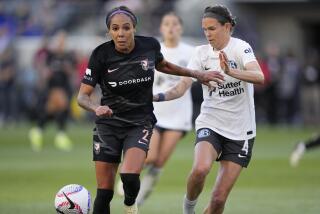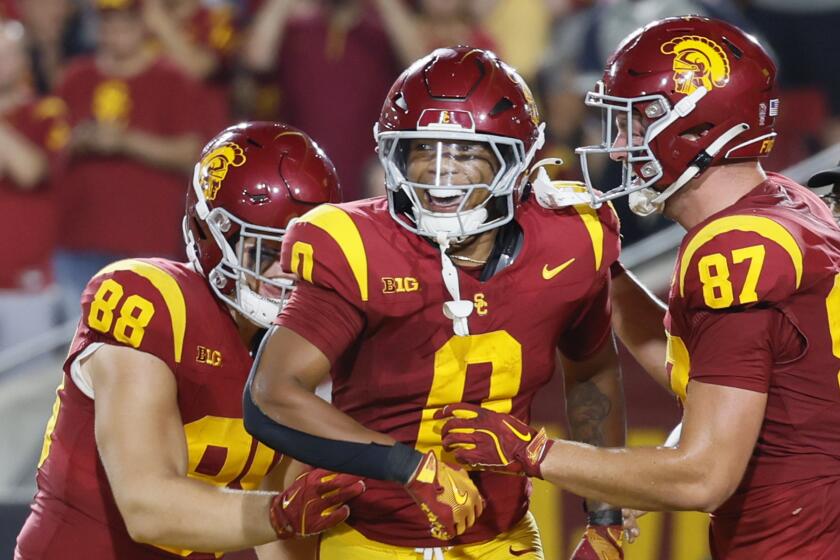NHL proposes 50-50 revenue split; other terms may be sticking points
The NHL kick-started its stagnant negotiations with the players’ association Tuesday by proposing a collective bargaining agreement based on a 50-50 split of hockey-related revenue between owners and players and contingent on a full season being played, starting Nov. 2.
Although the division of hockey-related revenue in each year of the proposed six-year deal is more favorable to players than the NHL’s previous offers to them of 43% and 47%, other terms are likely to raise their hackles, such as limiting contracts to five years and postponing eligibility for unrestricted free agency by a year to 28 years old or after eight years’ service.
Player representatives conferred via phone Tuesday. The union was expected to seek clarification from the league on various points before responding Wednesday or Thursday.
“We believe this was a fair offer for a long-term deal and it’s one that we hope gets a positive reaction so that we can drop the puck on Nov. 2, which, backing up, entails at least a one-week training camp,” Commissioner Gary Bettman told reporters in Toronto.
“So, we have about nine or 10 days to put this all to bed, signed, sealed and delivered in order for this offer to be effective and for us to move forward. We hope that this effort that we’ve undertaken today will be successful because we know how difficult this all has been for everybody associated with the game, particularly our fans.”
The NHL locked players out Sept. 15, intent on bringing their share of hockey-related revenue down from last season’s 57%. Training camp and regular-season games through Oct. 24 were canceled. To play 82 games, each team could make up games during lulls in the existing schedule and the season could be extended two weeks, into late April. A shortened season could be played if negotiations lag.
Neither side would provide full specifics of the proposal, but people familiar with the negotiations confirmed many key elements and said they saw a framework for a deal to be made.
There would be no immediate salary rollback for players, but they would still have to pay into an escrow fund. The league included a deferred-compensation element to pay them any lost value of their contracts. Transitional mechanisms would be in place for the first year allowing teams to spend to a cap of $70 million.
Entry-level contracts would be in effect for two years, instead of the current three, a move designed to postpone free agency and minimize the value of the second contracts that had escalated salary growth. In addition, teams also would be allowed to pay portions of players’ contracts after they trade those players, a practice not permitted now. The league offered to increase revenue sharing with small-market teams to $200 million, up from $150 million.
The union is expected to push back on the proposed five-year maximum for new contracts and the delaying of free agency. The proposal also would delay salary arbitration eligibility until after the player’s fifth season instead of the fourth, and would impose a maximum yearly variance of 5% within any contract. That provision is aimed at eliminating the lengthy, front-loaded contracts many teams devised to skirt salary cap restrictions in the previous labor agreement.
One or more of those elements could be altered to work in concert or separately. The union might also suggest a gradual drop of its share of hockey-related revenue instead of immediately going from 57% to 50%.
“I’ve been looking for a way to get these negotiations jump-started and if this does it, that would be great,” Donald Fehr, executive director of the NHL Players’ Assn., said in Toronto. “We’ll see, though.”
Allan Walsh of Octagon Hockey, a prominent player agent, said the proposal “marks the official start of negotiations toward a deal.” He added, “With an apparent deadline of Nov. 2 now in place to play a full 82-game regular season, the proposal represents a starting point toward getting the NHL back on the ice.
“I would caution everyone that we are now at the starting line, the NHL has wasted valuable time with ridiculous opening offers and the next seven days will reveal how serious the league is toward getting a new CBA to the finish line.”
twitter.com/helenenothelen
More to Read
Go beyond the scoreboard
Get the latest on L.A.'s teams in the daily Sports Report newsletter.
You may occasionally receive promotional content from the Los Angeles Times.











